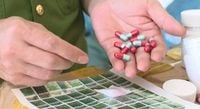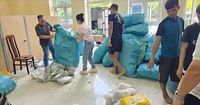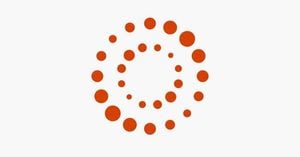On May 6, 2025, the Hanoi People's Committee took a significant step in combating the alarming rise of counterfeit goods by issuing Official Dispatch No. 1802/UBND-KGVX. This document outlines a comprehensive approach to strengthen coordination and enforce strict measures against organizations and individuals involved in the production and trading of fake medicines, fake milk, and counterfeit health foods.
The Chairman of the Hanoi People's Committee has urged the City Police to expedite investigations into detected cases and to handle them according to their authority and legal regulations. This directive comes in response to growing concerns over the safety and integrity of health products available to the public. The police will also organize specialized projects aimed at detecting and addressing violations related to the production and sale of these counterfeit goods across the city.
The Department of Health has been tasked with conducting a thorough review and inspection of compliance with legal regulations concerning the production, trading, and sale of medicines. They will lead a joint inspection team to scrutinize establishments dealing in functional foods, milk, and nutritional products. This initiative is crucial in ensuring that the public is protected from potentially dangerous counterfeit products.
In a coordinated effort, the Department of Health will work closely with the City Police and other relevant units to investigate and resolve cases of counterfeit goods. Their collaboration is essential in tackling the issue effectively and ensuring that violators face appropriate consequences.
The Department of Industry and Trade will also play a pivotal role in this crackdown. They are set to lead inter-sectoral inspection teams targeting establishments involved in the production and trading of functional foods and nutritional products. Their mandate includes monitoring the distribution and circulation of goods, with a particular focus on e-commerce platforms, which have become a popular avenue for counterfeit goods.
In addition to inspections, the Department of Industry and Trade is committed to promptly detecting, preventing, and strictly handling any activities related to the production and sale of counterfeit goods. This proactive approach aims to safeguard consumers and maintain the integrity of legitimate businesses.
The Department of Culture and Sports will also be involved, working alongside other units to review and address violations in advertising related to medicines, milk, and health foods. This includes scrutinizing advertisements in newspapers, on the internet, and across social media platforms. Their efforts will help to raise awareness and ensure that misleading information does not reach consumers.
To enhance public understanding of food safety policies and laws, the Department of Culture and Sports will promote information campaigns aimed at organizations and individuals involved in the production and trading of health-related products. They will also publicize establishments that violate regulations, ensuring that the public is informed and can take preventative measures.
People's Committees at district, town, and city levels are also expected to step up their efforts. They will implement peak periods of inspection to ensure compliance with laws regarding pharmaceuticals and food safety. This initiative aims to identify and address violations swiftly, thus reinforcing the overall regulatory framework.
As part of these efforts, the Department of Finance will ensure that adequate funding is available for the inspection and enforcement activities related to pharmaceuticals and food safety. This financial backing is vital for the successful execution of the planned inspections and investigations.
The urgency of this initiative cannot be overstated. The rise in counterfeit goods poses a serious threat not only to public health but also to the economy. By cracking down on these illegal activities, the Hanoi People's Committee aims to restore public confidence in health products and ensure that consumers have access to safe and authentic goods.
Local police are being called upon to enhance their vigilance and promptly identify any violations of the law. This is a crucial aspect of the broader strategy to combat counterfeit goods, as timely intervention can prevent further distribution and potential harm to consumers.
Moreover, the Department of Health will continue to review and inspect compliance with legal regulations regarding the production and trading of medicines. They will organize inter-sectoral inspection teams to ensure that establishments involved in functional foods, milk, and nutritional products adhere to the law.
In conclusion, the coordinated efforts of various departments and agencies in Hanoi reflect a strong commitment to tackling the issue of counterfeit goods. By enhancing inspections, promoting public awareness, and ensuring strict enforcement of regulations, the city is taking significant strides to protect its citizens from the dangers of fake medicines, milk, and health foods.





